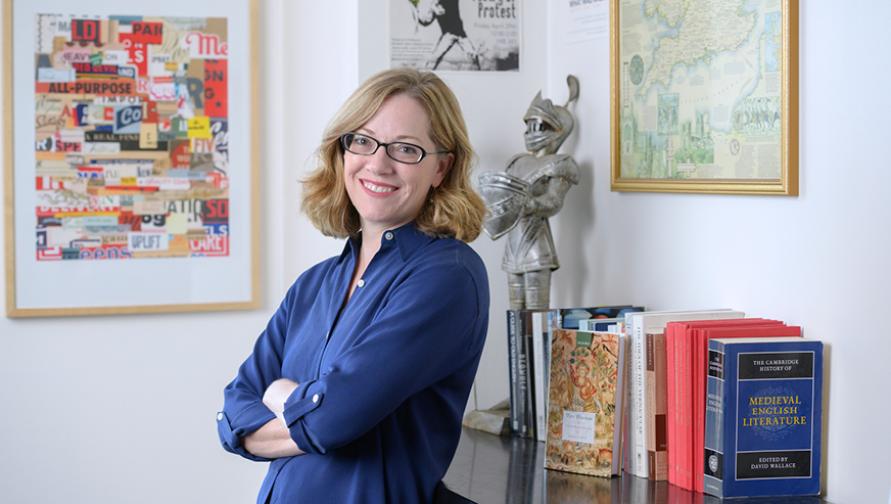
By Lilibeth Garcia
To describe something as “medieval” is to conjure images of superstition and moral and intellectual backwardness. For some, the word is synonymous with “outdated.” But Rebecca Davis, a professor of English at the University of California, Irvine, shows students a different reality. In her most recent classes, students learn about the rich and diverse literature found in illustrated bestiaries, in fables that offer wisdom for surviving a dangerous world, and in Geoffrey Chaucer’s philosophical remixes of old stories.
“Although there’s this fascination with the otherness of the Middle Ages, what I think really sticks with my students and with me is how, even though they often had different answers, medieval people were asking many of the same questions that we ask today,” Davis says.
Davis can relate to students who might be put off by the vast and alien world of medieval literature. She was in her junior year as an English major when she took a class on Chaucer, while studying abroad in London. The world of medieval literature proved challenging to her, especially compared to her British classmates whose understanding appeared intuitive. However, reading the Middle English passages out loud at night revealed something she had previously missed. Spoken aloud, the words that were strange on the page began to feel familiar. As she walked the city, and traveled further afield by bus and train, the cathedrals and ruins of Britain, remnants of ancient cities, added to the intrigue of the medieval past. Although she would be graduating soon, she realized she had stumbled upon something she wanted to learn more about.
Davis has come a long way since her first encounter with the medieval world as an undergraduate. She recently received the inaugural Anne Middleton Book Prize for her first book, Piers Plowman and the Books of Nature (Oxford University Press, 2016). The book contextualizes the theological vocabulary of William Langland’s poem within medieval discourses on the relationship of nature and divinity. Her additional teaching and research interests encompass writings by medieval women in a literary world dominated by men; conceptions of psychology in premodern texts; and metafiction, or the ways stories unfold within stories.
“In a sense, reading a medieval text is analogous to meeting someone from another country, especially someone whose cultural, religious backgrounds and traditions are really different from your own,” Davis says. “You have to cross those barriers to find out: here’s where we’re different, but this is what we have in common. Medieval people also grappled with those questions that we’re still faced with when we read the news or we see human, or animal, suffering, and we think, why does this happen and what can I do about it?”
Davis tackles these questions through both premodern and contemporary perspectives in her classes. This fall, she will teach the first three weeks of lectures in Humanities Core, a year-long, team-taught course that all new humanities majors are required to take. The theme for this year’s course is “Animal/Culture.” Davis’ lectures for the course explore some of the earliest conceptions of animals in European literature. The medieval literary world understood animals by assigning them spiritual meanings and using them to promote moral teachings, such as those found in Marie de France’s medieval adaptations of Aesopic fables—stories that are still being read and adapted for new audiences today.
Looking back at the medieval past may now be more relevant than ever before, Davis acknowledges. With white supremacists appropriating medieval symbols to promote racist ideas, medieval scholars like Davis feel responsible to explore this cultural phenomenon and combat it by reexamining the way medieval writers—and scholars of the medieval period—represent race. To do so, Davis has started a reading group that discusses medieval representations of race and how those constructions have contributed to contemporary ideas about race. The Medieval Race Reading Group’s first discussion in spring brought together an interdisciplinary group of faculty and students. Davis is also organizing the Center for Early Cultures’ 2019-20 lunch series, which will continue this conversation with the help of visiting speakers who study early periods and have written extensively on the representation of race in the Middle Ages and in medieval scholarship.
As if teaching intensive classes and leading extracurricular discussion groups weren’t enough, Davis is excitedly preparing to write a new book, which will revisit an ancient idea through a fresh perspective. Here she explores the relationship between the theological concept of grace, usually associated with divine mercy, and a literary idea of grace, which she describes as the open-endedness and expansive potential of some forms of medieval storytelling. Davis hopes to show that the underlying concept of God’s grace, which provides the faithful with new opportunities and second chances, serves as a model for storytellers who use language to manipulate time, forestall ends, and change the direction of overarching narratives.
“I’ve just written an article about a medieval play called the Castle of Perseverance. Before the play begins, the text describes these guys who go out and announce that the play is coming in a week. They announce it to the town, saying that this play will be performed ‘under God’s grace,’” Davis says. “While they’re inaugurating or setting up the conditions under which the play will be performed, they’re doing that by invoking divine grace. Little gestures like that are clues about the way that medieval writers associated divine grace with human acts of creativity.”
Although long gone, the medieval world continues to serve as a tool to learn about the past, present, and future. “It’s kind of like turning the kaleidoscope around, so you can look at the same question from a different viewer’s perspective,” Davis says.
Photo credit: Ebrahim Safi
